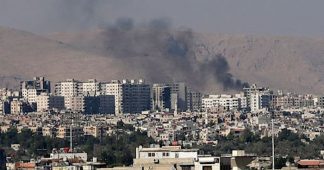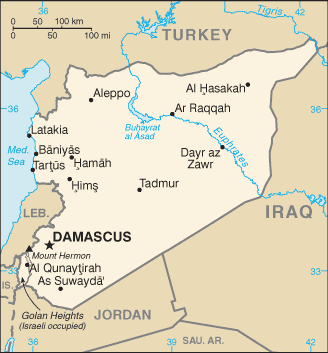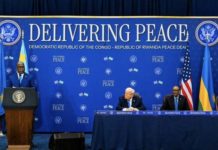By Bill Van Auken
The Syrian government and its key ally, Russia, have launched a fresh offensive against Islamist militias backed by the US and its regional allies both in the besieged eastern sector of Aleppo and in Idlib and Hama governorates in northwestern Syria.
Syrian fighters and helicopters carried out airstrikes against eastern Aleppo, where Russia had maintained a suspension of all air operations for the past month. Russia, meanwhile, confirmed that it had conducted bombing runs and missile strikes for the first time from the war fleet it has positioned off the Syrian coast in the eastern Mediterranean. The Russian Defense Ministry said that its forces had hit ISIS and the Al Qaeda-affiliated Al Nusra Front in the countryside of Idlib and Hama.
The US State Department issued a hysterical response to the renewed offensive, accusing Russia of carrying out air strikes “in violation of international law,” under conditions in which the US is conducting similar strikes, without the authorization of either the United Nations or the Syrian government, in its anti-ISIS campaign in Syria, as well as in the offensive in Iraq against the city of Mosul. The State Department spokeswoman also accused the Russians of having “allowed no food or aid into east Aleppo.” When pressed, however, she was unable to point to any action taken by Russia to block such aid.
There have been multiple reports from eastern Aleppo of demonstrations by the city’s residents denouncing the Islamist militias for hoarding food supplies and demanding that they leave the city. In some instances there were violent clashes when civilians attempted to gain access to the “rebel” food warehouses. It has been a common practice for the US-backed Islamist militias to monopolize food and supplies, selling them to the people in areas they occupy at exorbitant rates. There have also been reports of Al Qaeda-linked fighters killing civilians for attempting to leave the besieged zone of Aleppo. None of these crimes, needless to say, have evoked any protest from the State Department.
The heated nature of the US rhetoric is a reflection of the increasingly desperate situation confronting the Islamist militias that have served as Washington’s proxy forces in the five-year-old war for regime change that has left Syria in tatters. A defeat for the Al Qaeda-affiliated elements in Aleppo would deprive the so-called rebels of their last major urban stronghold in Syria.
The same level of political hysteria has been directed at the prospect that an incoming Trump administration would seek a rapprochement with the Russian government of President Vladimir Putin, including over military operations against ISIS in Syria and Iraq.
In response to the report of Monday’s telephone conversation between Trump and Putin which, according to a statement from the Kremlin, included an agreement on “the need to work together in the struggle against the No. 1 enemy–international terrorism and extremism,” there were multiple condemnations of Trump by both the major media and fellow Republicans.
The Washington Post published an editorial Wednesday charging that Trump “has all but given Mr. Putin the green light for atrocities.” The editorial’s line repeated similar criticisms made in a November 13 editorial in the New York Times entitled “The danger of going soft on Russia,” which accused the Republican president-elect of having “shown little concern that Russia poses a major strategic challenge” and accused him of having “so far been Mr. Putin’s apologist.”
Similarly, Arizona Republican Senator John McCain, the chairman of the Senate Armed Services Committee, issued a statement Tuesday denouncing any amelioration of relations with Moscow. “At the very least, the price of another ‘reset’ would be complicity in Putin and Assad’s butchery of the Syrian people,” McCain said.
Meanwhile, the House of Representatives Tuesday passed by a voice vote a sweeping new sanctions bill against Syria and anyone doing business with the country. In addition, the bill demands that the US president present a report on the prospect of establishing “a no-fly zone or a safe zone over part or all of Syria,” an action that US military commanders have warned would lead to armed confrontation with Russia.
On the same day, the House voted 419 to one for a 10-year re-authorization of the Iran Sanctions Act, or ISA, a law first adopted in 1996 to punish those doing business with Iran’s energy industry, supposedly to block Teheran’s alleged program to develop nuclear weapons. The bid to reimpose this measure, even after the negotiation of an international agreement on Iran’s nuclear program, is in line with Trump’s own denunciations of this deal and indications during the presidential campaign that he would renege on it.
The concerns expressed within the US ruling establishment over a supposed danger posed by Trump’s campaign rhetoric that he will “go soft” on Russia or abandon Washington’s regime change war in Syria are belied by the politics of those he has brought around his transition and who are in the running for top cabinet posts in his administration.
Former New York City Mayor Rudy Giuliani, who has been named as a top choice for secretary of state, speaking to an audience of business executives Monday, suggested that the “reset” with Moscow could be achieved through military confrontation. “Russia thinks it’s a military competitor, it really isn’t,” Giuliani said. “It’s our unwillingness under Obama to even threaten the use of our military that makes Russia so powerful.”
Stephen Hadley, the former national security advisor to George W. Bush, who is reportedly under consideration for nomination as secretary of defense, has repeatedly called for launching strikes against Syria with Tomahawk cruise missiles, a weapon produced by defense contractor Raytheon, where he has served on the board of directors.
Sources close to the Pentagon have expressed buoyant optimism that the incoming Trump administration will initiate a massive US military buildup.
The Navy Times Tuesday highlighted the president-elect’s vow to build a 350-ship naval fleet in an article headlined “Donald Trump wants to start the biggest Navy build-up in decades.” The Navy currently has a fleet of 272 ships.
The Army Times, meanwhile, published an article Tuesday headlined “Early signs point to a bigger, badder Army under Trump.”
It quoted former four-star General Barry McCaffrey as predicting that despite Trump’s criticisms of NATO he expected to see a major buildup of US forces not only in the Pacific but also in Eastern Europe.
“You’ve got to have a military combat capability that is believed by the Russians and the North Koreans, among others, as being capable and willing to confront them in an air-ground-sea battle,” he said.
McCaffrey added that there had been “overwhelming support for Trump during the campaign from the rank-and-file of the armed forces,” due in part to his criticism of restrictive “rules of engagement.”
The article also quoted Alabama Republican Senator Jeff Sessions, a prominent Trump supporter also reported to be a leading choice for secretary of defense, saying that Trump “proposes an increase in the Army.”
“We now have about 480,000 troops. He proposes that the Army should be sustained at 540,000 troops,” Sessions said.
In short, whatever Trump’s campaign rhetoric about rapprochement with Russia or halting the US intervention in Syria, all indications are that the incoming administration is preparing to embark on an even more reckless and aggressive campaign of global US military aggression.











